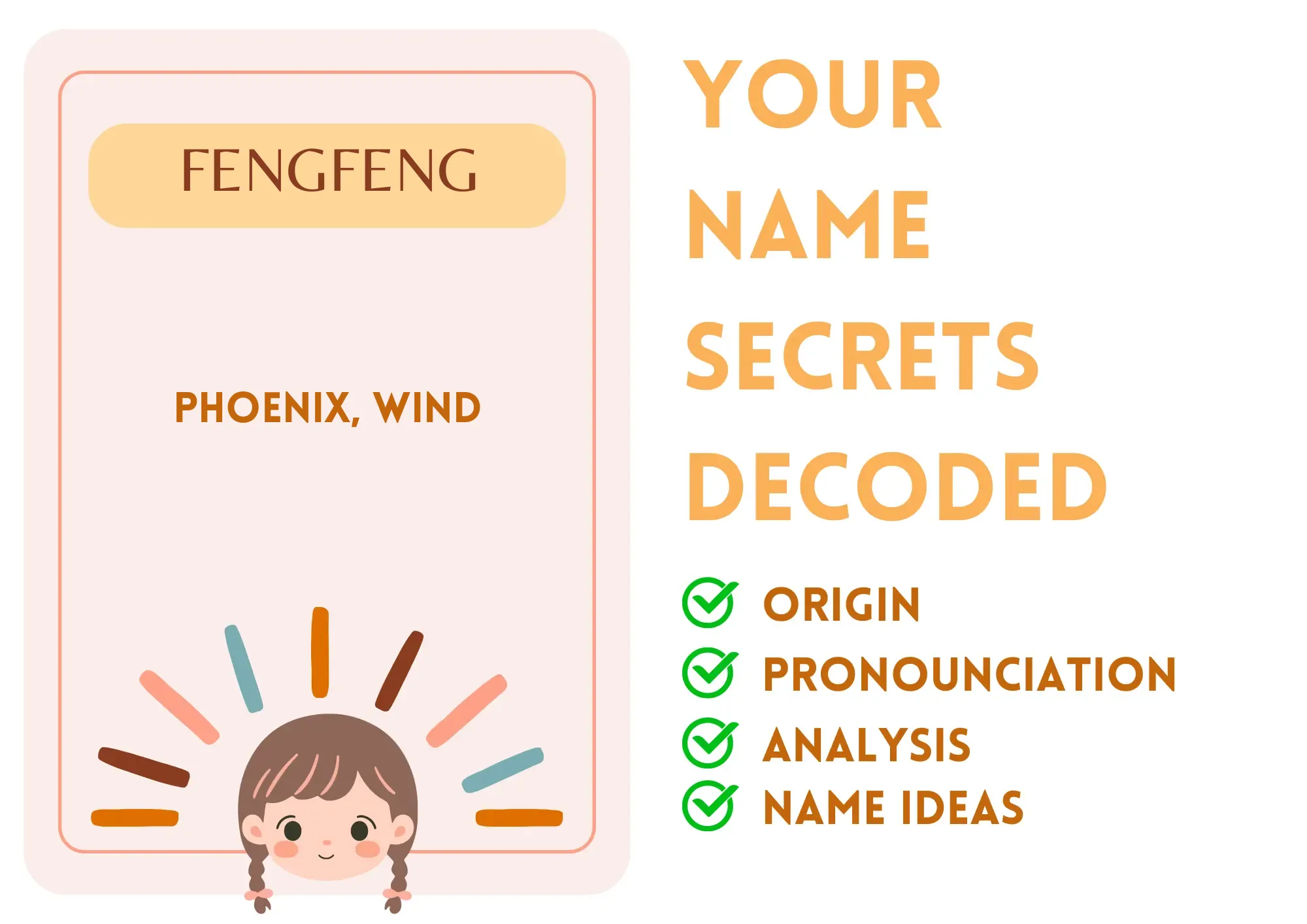
Fengfeng
Fengfeng is a charming name of Chinese origin, which embodies the meaning of 'phoenix' or 'wind.' The repetition of the syllable emphasizes a sense of grace and delicacy. Commonly used in Chinese-speaking regions, Fengfeng can be given to both boys and girls but is predominantly used as a feminine name. In Chinese culture, the phoenix symbolizes prosperity, virtue, and good fortune, making this name auspicious.
The name Fengfeng is widely perceived as graceful and elegant, often evoking feelings of beauty and resilience, akin to the mythical bird rising from the ashes. It is relatively easy to pronounce and write, though its uniqueness might make it less familiar to non-Chinese speakers.
Fengfeng appears sporadically in popular culture, notably in literature and folklore surrounding Chinese mythology, symbolizing transformation and the emergence of beauty from trials.
Basic Information
Gender: Girl
Sounds Like: FUNG-fung
Pronunciation Explanation: The first syllable is pronounced like the English word 'fung' and the second syllable is similar to 'fung.'
Summary and Meaning
Meaning: phoenix, wind
Origin: The name Fengfeng has Chinese origins, deeply rooted in Chinese mythology and culture.
Usage: Fengfeng is primarily a feminine name, but it can also be used unisexually in some contexts.
Name Number (Chaldean)
Name Number (Pythagorean)
Popularity (Global Rank)
Overall: 357805
Girls:
Most Popular in
Religious and Cultural Significance
Religion: Chinese folklore and cultural significance
Background: Fengfeng ties closely to Chinese mythology, where the phoenix is one of the four celestial animals, symbolizing fire and the virtues of virtue.
Cultural Significance: In Chinese culture, the phoenix is often a symbol of rebirth, transformation, and feminine beauty, making the name Fengfeng an auspicious choice.
Historical Significance: The symbolism of the phoenix in Chinese culture dates back thousands of years, representing renewal, nobility, and an embodiment of yin and yang—hence carrying historical importance.
Popular Culture
Literature and Mythology: Fengfeng may not be directly referenced frequently, but stories of phoenixes and their symbolism appear across Chinese literature and folklore.
Movies and Television: Characters related to the phoenix myth often appear in various Chinese films and television shows, emphasizing themes of transformation and resilience.
Feelings and Perceptions
Perception: Fengfeng is generally perceived as an exotic and poetic name. It carries a sense of elegance and charm associated with the mythical phoenix.
Positive Feelings: Graceful, enchanting, auspicious, resilient, beautiful.
Negative Feelings: Some may find it tricky to pronounce correctly, particularly outside of Chinese-speaking communities.
Practical Considerations
Ease of Writing and Calling: Fengfeng is relatively easy to write, composed of two syllables and seven characters. Its pronunciation may be challenging for non-native speakers, yet the phonetic spelling helps.
Common Typos and Misspellings: Feng-feng,Feng Feng,Feng fang,Feng hung
Common Nicknames: Feng,Fifi,Fengy
Fengfeng Popularity
Fengfeng Usage and Popularity By Country
| Country | Rank (Overall) |
|---|---|
| Switzerland | 22775 |
| Japan | 26195 |
| Germany | 51089 |
| Canada | 61528 |
| Australia | 105589 |
| France | 158953 |
| United Kingdom | 182431 |
| United States | 344452 |
Fengfeng Usage and Popularity By City
| City | Rank (Overall) |
|---|---|
| Shanghai | 4053 |
| Peking | 4505 |
Compatibility Analysis
Famous Persons Named Fengfeng
No results found for Fengfeng.
Related Names
Similar Sounding Names:
Feng,Fengyi,Fei,Fangfang